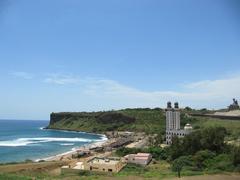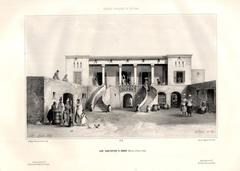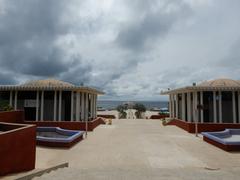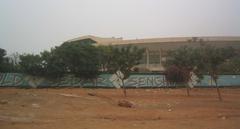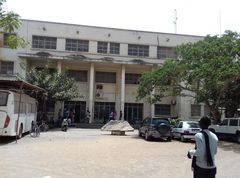National Library of Senegal Visiting Hours, Tickets, and Guide to Dakar Historical Sites
Date: 14/06/2025
Introduction: The National Library of Senegal – History and Cultural Significance
Nestled in Dakar’s Plateau district, the National Library of Senegal (Bibliothèque Nationale du Sénégal) serves as a vital institution safeguarding the nation’s literary, historical, and cultural heritage. Evolving from its colonial roots to become a symbol of post-independence identity, the library houses a rich collection of documents, rare manuscripts, and publications reflecting Senegal’s diverse cultural landscape. It not only supports research and education but also acts as a vibrant hub for cultural initiatives, promoting intellectual engagement and artistic expression. With its collections encompassing French and indigenous languages such as Wolof, Pulaar, and Serer, the library strengthens Senegalese identity and memory, making it an essential stop for scholars, students, and travelers alike.
For more about the library’s mission and visitor information, see the National Library of Senegal official page and the comprehensive Dakar historical sites guide.
Table of Contents
- Introduction
- History and Development
- Cultural Importance
- Visitor’s Guide
- Visual and Interactive Resources
- Frequently Asked Questions
- Conclusion
- References
History and Development of the National Library of Senegal
Colonial Foundations
The National Library’s roots trace back to early 20th-century institutions: the Archives Nationales library (1913), the IFAN library (1938), and the Centre de Recherche et de Documentation (1944). These bodies collectively performed national library functions through the colonial and post-independence periods.
Legal Deposit and National Status
A significant milestone was achieved in 1976 with decree 76-493, introducing legal deposit for all Senegalese publications. This cemented the library’s role in preserving national output and cultural autonomy.
Modern Structure and Role
By the 1990s, the National Library’s responsibilities were shared among its foundational institutions, each specializing in different domains but collectively serving as Senegal’s bibliographic core.
Cultural Importance in Senegalese Society
Preserving National Memory
The library maintains a vast archive of books, official documents, and rare manuscripts—essential for a society with deep oral traditions—ensuring the country’s collective memory endures.
Promoting Language and Identity
Alongside French materials, the library houses works in Wolof, Pulaar, Serer, and more. Modern initiatives emphasize local heritage, from renaming streets to promoting Senegalese authors and revising educational content.
Role in Education and Research
As an intellectual nucleus, the library provides vital resources for students, researchers, and the public, fostering study in Senegalese history, literature, and social sciences. Partnerships with institutions like Cheikh Anta Diop University and the West African Research Center expand its academic reach (WARC Library).
Visitor’s Guide: Hours, Tickets, and Accessibility
Location and Access
Situated on Avenue Léopold Sédar Senghor, in central Dakar (12500), the library is easily reached by taxi or public transport. Additional facilities are located at Central Park Building (Avenue Malick Sy) and Rue Mousse Diop (FamilySearch). Taxis are the most reliable transport; always agree on a fare in advance (The Wandering Afro).
Visiting Hours
- Monday to Friday: 8:00 AM – 5:00 PM (often with a midday break)
- Saturday and Sunday: Closed
- Public Holidays: Hours may vary; confirm before visiting
Always check ahead via phone (+221 78 438 74 68) or the official website for updates.
Tickets and Admission
- General Admission: Free
- Special Collections or Archives: May require prior arrangement or nominal fee
- Guided Tours: Not regularly scheduled, but available for special events or by request
Accessibility and Facilities
- Wheelchair Access: Main building accessible; call ahead for annex details
- Reading Rooms: Quiet, well-lit spaces for study
- Reference Services: Staff available for research assistance
- Digital Resources: Access to Africana Collections Online, African Journals Online, and JSTOR (WARC Library)
- Wi-Fi/Computers: Limited availability; bring your own device for best results
Nearby Dakar Historical Sites and Attractions
Enhance your cultural experience by visiting these sites within walking distance or a short taxi ride from the library:
- IFAN Museum of African Arts: Traditional and modern African art
- Museum of Black Civilisations: Highlights global Black history and achievements
- Our Lady of Victories Cathedral: Moorish-Gothic architecture
- Grande Mosquée de Dakar: Renowned for its minaret and tilework
- Independence Square (Place de la République): Historic city center
- Marché Kermel: Lively market for produce and crafts
- Assemblée Nationale du Sénégal: Landmark government building
- Autonomous Port of Dakar: Key West African port
- Gorée Island: UNESCO-listed, with a profound history related to the transatlantic slave trade
- African Renaissance Monument: Africa’s tallest statue with panoramic city views
For details, consult the Dakar historical sites guide.
Practical Travel Tips
- Language: French and Wolof dominate; translation apps are helpful
- Dress Code: Modest attire is appreciated (The Wandering Afro)
- Currency: West African CFA franc (XOF); cash is preferred (Afoma’s Travels)
- Connectivity: SIM cards available; library Wi-Fi may be limited (Claires Footsteps)
- Safety: The area is safe but remain vigilant with valuables
- Food/Water: Bring snacks and bottled water; tap water not recommended
- Health: Yellow fever vaccination may be required; malaria prophylaxis suggested for travel outside Dakar
- Photography: Permitted in designated areas; always ask for permission
- Facilities: No café inside the library—many options nearby
Visual and Interactive Resources
The library’s website features virtual tours and high-resolution images of collections and exhibitions (alt tags: “National Library of Senegal visiting hours,” “Dakar historical sites near National Library”).
Frequently Asked Questions (FAQ)
Q: What are the National Library’s visiting hours?
A: Monday to Friday, 8:00 AM to 5:00 PM (hours may vary on holidays).
Q: Is there an entrance fee?
A: General admission is free; special collections may require arrangement or a fee.
Q: Are guided tours available?
A: Not regularly, but possible during events or upon request.
Q: Is the library accessible for visitors with disabilities?
A: The main building is accessible; call ahead for annex information.
Q: Can I take photographs inside?
A: Ask staff for photography permissions, especially in archival areas.
Conclusion
The National Library of Senegal stands as a beacon of the nation’s resilience and cultural richness, offering free access to extensive collections and fostering a deeper understanding of Senegalese heritage. Its central location in Dakar’s Plateau district places it at the crossroads of history, culture, and modernity, inviting visitors to explore not just the library itself, but a tapestry of nearby landmarks and historical sites.
For current information on visiting hours, upcoming events, and special collections, always consult the official website and consider combining your library visit with other local attractions for a full cultural experience.
Maximize your journey with the Audiala app for real-time updates, travel tips, and guides to Dakar’s cultural highlights.
